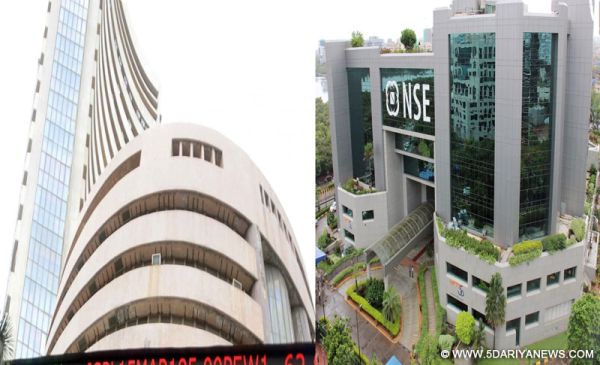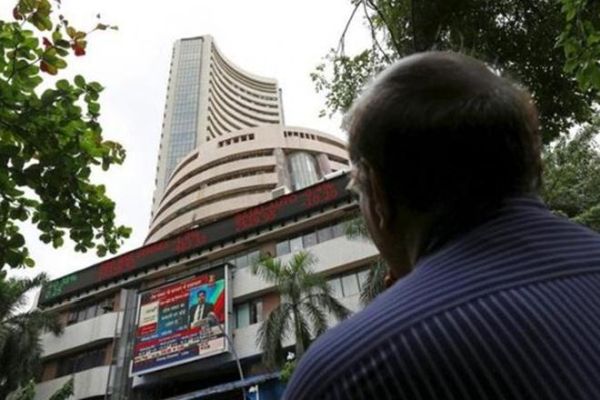
by admin | May 25, 2021 | Economy, Markets, News
 By Porisma P. Gogoi,
By Porisma P. Gogoi,
Mumbai : Key Indian equity indices — the BSE Sensex and the NSE Nifty — witnessed further correction and closed lower by almost two per cent during the week ended Friday, as persistent outflow of foreign funds on the back of a weak rupee, coupled with geo-political risks, suppressed investors’ sentiments.
However, the indices pared most of their losses towards the later half of the week and closed on a flat note as sentiments were buoyed by continous pumping in of funds by domestic institutional investors (DIIs) and bargain hunting.
On a weekly basis, the 30-scrip Sensitive Index (Sensex) of the BSE plunged by 638.72 points or two per cent to close at 31,283.72 points.
Similarly, the Nifty50 of the National Stock Exchange (NSE) receded by 175.8 points or 1.76 per cwent to close the week’s trade at 9,788.60 points.
“Carrying on from last week, markets continued to correct further this week. A bounce back towards the end of the week helped to curb the losses,” Deepak Jasani, Head – Retail Research, HDFC Securities, told IANS.
“Sectorally, the top gainers were the metal, realty and auto indices. The top losers were the PSU banks, pharma and FMCG indices,” he added.
According to Dhruv Desai, Director and Chief Operating Officer of Tradebulls, the Indian markets snapped a seven-day losing streak on September 28 and ended with modest gains as traders covered their short positions on the eve of September series derivative expiry.
Market observers pointed out that the seven-day fall was the longest losing streak for the indices after a nine-day fall that occurred during December 13-26, 2016.
“The geo-political wave continued for yet another week, this time from Indian forces taking military action against militant’s hideouts in Myanmar,” Desai told IANS.
D.K. Aggarwal, Chairman and Managing Director, SMC Investments and Advisors, said: “In the week gone by, investors sold equities on the back of geo-political concerns between the US and North Korea. Strong words got exchanged between the two countries, increasing the possibility of a war-like situation.”
“Back at home, concerns pertaining to the possibility of fiscal slippage on the possibility of fiscal stimulus to boost growth receded with government announcing that it will stick to the budget plan,” Aggarwal told IANS.
On the currency front, the Indian rupee weakened by 49 paise to close the week at 65.29 to a US dollar from its previous week’s close at 64.80.
“During the week, weakness in the indices continued with rupee becoming weak and crude oil prices rising,” said Anita Gandhi, Whole Time Director at Arihant Capital Markets.
“FIIs (foreign institutional investors) continued to be net sellers in the Indian equities, however DIIs gave good support with positive flows,” Gandhi added.
Provisional figures from the stock exchanges showed that FIIs continued with their selling spree and off-loaded stocks worth Rs 10,896.59 crore during the week, whereas the DIIs bought scrip worth Rs 11,666.60 crore.
Figures from the National Securities Depository (NSDL) revealed that foreign portfolio investors (FPIs) divested equities worth Rs 5,899.95 crore, or $897.14 million, during September 25-29.
The top weekly Sensex gainers were: Coal India (up 6.58 per cent at Rs 270.60); ONGC (up 3.77 per cent at Rs 170.65); Bajaj Auto (up 2.16 per cent at Rs 3,105); Power Grid (up 1 per cent at Rs 211.85); and Axis Bank (up 0.98 per cent at Rs 510).
The losers were: Asian Paints (down 8.07 per cent at Rs 1,117.05); Adani Ports (down 6.01 per cent at Rs 377.15); Hindustan Unilever (down 5.20 per cent at Rs 1,175.15); Dr. Reddys Lab (down 5.18 per cent at Rs 2,329.40); and Wipro (down 4.46 per cent at Rs 280.95).
(Porisma P. Gogoi can be contacted at porisma.g@ians.in)
—IANS

by admin | May 25, 2021 | Economy, Markets, News
 By Rohit Vaid,
By Rohit Vaid,
Mumbai : Subdued macro-economic sentiment, coupled with rising geo-political tensions in the Korean Peninsula and continuous outflows of foreign funds dragged the key Indian equity markets in the red last week.
Consequently, the two key indices — the BSE Sensex and the NSE Nifty — receded below their psychologically important levels of 32,000-points and 10,000-points as investors were spooked over a possibility of government exceeding its fiscal deficit target to stimulate the economy.
On a weekly basis, the 30-scrip Sensitive Index (Sensex) of the BSE declined by 350.17 points or 1.09 per cent to 31,922.44 points.
Similarly, the Nifty 50 of the National Stock Exchange (NSE) edged lower to 9,964.40 points, down 150.6 points or 1.19 per cent.
According to Dhruv Desai, Director and Chief Operating Officer of Tradebulls, rising geo-political tension eroded investors’ risk-taking appetite and subdued global and domestic markets.
“Geo-political tensions, continue to take centre stage, as things have gone from bad to worse,” Desai said.
Besides geo-political tensions, FOMC (Federal Open Market Committee) minutes dampened investors’ sentiments. The US Fed has indicated that there will be one rate hike in December 2017 and three in 2018.
A likely US rate hike can potentially drive away foreign portfolio investors (FPIs) from emerging markets such as India.
“Domestic markets became nervous after the US Federal Reserve outlined plans to unwind its $4.2 trillion balance sheet starting next month,” D.K. Aggarwal, Chairman and Managing Director, SMC Investments and Advisors, told IANS.
“The domestic currency hit 65 levels against the US dollar for the first time in more than five months on the back of speculation about the government going in for a fiscal deficit relaxation, with talk of a Rs 40,000-Rs 50,000 crore stimulus.”
Provisional figures from the stock exchanges showed that FIIs continued with their selling spree and off-loaded stocks worth Rs 5,448.66 crore during the week.
However, domestic institutional investors bought scrip worth Rs 3,581.88 crore.
Figures from the National Securities Depository (NSDL) revealed that foreign portfolio investors (FPIs) divested equities worth Rs 3,911.21 crore, or $354.46 million, during September 18-22.
On the currency front, the Indian rupee weakened by 72 paise to close the week at 64.80 to a US dollar from its previous week’s close at 64.08.
Market observers added that liquidity was redirected from equities to insurance IPOs of ICICI Lombard and SBI Life.
“During the week Insurance IPOs of ICICI Lombard and SBI Life sucked some liquidity from markets, FII flows remained negative… Indian rupee became weak against the US dollar along with most of Asian currencies,” said Anita Gandhi, Whole Time Director at Arihant Capital Markets.
“Macro factors like fiscal deficit, CAD, inflation and new employment generation indicated weakness.”
(Rohit Vaid can be contacted at rohit.v@ians.in)
—IANS

by admin | May 25, 2021 | Economy, Markets, News
 By Porisma P. Gogoi,
By Porisma P. Gogoi,
Mumbai : Boosted by positive global cues on the back of easing geo-political concerns, healthy domestic industrial production data and persistent pumping in of funds by domestic investors, Indian equity markets rode the bulls during the week ended Friday.
The two key Indian equity indices — the BSE Sensex and the NSE Nifty — reclaimed their psychologically important 32,000 and 10,000 levels. Despite that, the equity markets ended the week on a muted note as investors booked profits.
On a weekly basis, the 30-scrip Sensitive Index (Sensex) of the BSE surged by 585.09 points or 1.85 per cent to close the week at 32,272.61 points.
Meanwhile, the Nifty50 of the National Stock Exchange (NSE) closed at 10,085.40 points, up 150.6 points or 1.52 per cent.
“Nifty rallied this week after breaking out of the 9,740-9,988 trading range. Sectorally, the top gainers were the pharma, media and infra indices. There were no losers,” Deepak Jasani, Head – Retail Research, HDFC Securities, told IANS.
Vinod Nair, Head of Research, Geojit Financial Services, said: “This week, market emerged out of the consolidation phase on account of continued uptrend in global market as geo-political risks eased out.”
“Additionally, domestic economic data supported this positive trend. Nifty made a high of 10,132. However, continued FII (foreign institutional investors) selling, lack of fresh triggers and expectation of tighter liquidity led the market to trade in a range bound manner,” Nair added.
Provisional figures from the stock exchanges showed that FIIs continued with their selling spree and offloaded stocks worth Rs 3,365.4 crore during the week.
However, the outflow was offset by continous injection of funds by the domestic institutional investors, who bought scrips worth Rs 3,835.21 crore.
Figures from the National Securities Depository (NSDL) revealed that foreign portfolio investors (FPIs) divested equities worth Rs 119.46 crore, or $18.79 million, during September 11-15.
During the week, the Indian rupee weakened by 28-29 paise to close the week at 64.07-08 to a US dollar from its previous week’s close at 63.79.
According to D.K. Aggarwal, Chairman and Managing Director, SMC Investments and Advisors, global stock market got pulled back from record highs after disclosure of weaker-than-expected Chinese economic data.
“The sentiments got further weakened after North Korea test-fired another ballistic missile… European stock markets were mixed as market participant assessed geo-political developments and looked ahead to the Bank of England’s latest policy decision,” Aggarwal told IANS.
“Back at home, domestic ended the volatile session amid tepid global cues due to disappointing China’s economic data and as fresh missile launch by North Korea weighed,” he added.
Official data released during the week showed that factory output (Index of Industrial Production) in July rose by 1.2 per cent as compared to the same month of last year, whereas August’s consumer price index (CPI) inflation shot up a full one percentage point to 3.36 per cent.
“Higher prices of food and fuel products drove inflation based on wholesale price index (WPI) to a four-month high of 3.24 per cent in August even as experts said the rise is in expected lines,” said Dhruv Desai, Director and Chief Operating Officer of Tradebulls.
Speaking about another development during the week, Desai told IANS: “Reliance Industries, the most valued company on BSE in terms of market capitalisation has touched its all-time high of Rs 849.7 per share during the week.”
The top weekly Sensex gainers were: Sun Pharma (up 11.20 per cent at Rs 523.80); Tata Motors (DVR) (up 9.26 per cent at Rs 228.95); Tata Motors (up 6.99 per cent at Rs 401.25); Adani Ports (up 4.95 per cent at Rs 404); and Axis Bank (up 4.93 per cent at Rs 517.55).
The losers were: Wipro (down 4.88 per cent at Rs 285.75); Hero MotoCorp (down 1.54 per cent at Rs 3,898); Bharti Airtel (down 1.29 per cent at Rs 398); ITC (down 1.14 per cent at Rs 269.35); and HDFC (down 0.42 per cent at Rs 1,770.85).
(Porisma P. Gogoi can be contacted at porisma.g@ians.in)
—IANS


